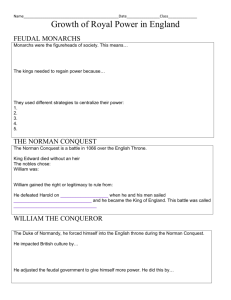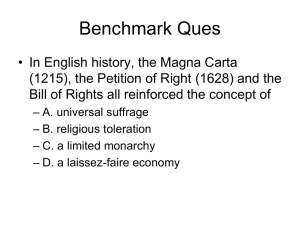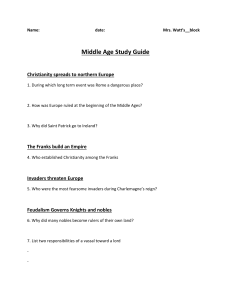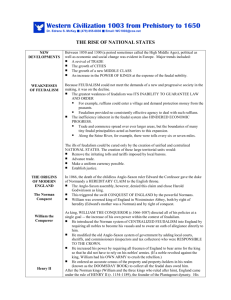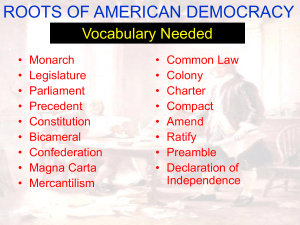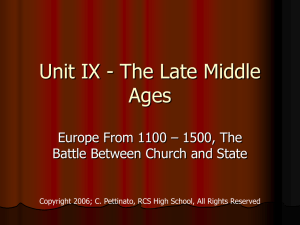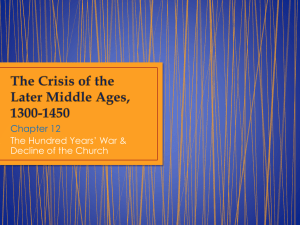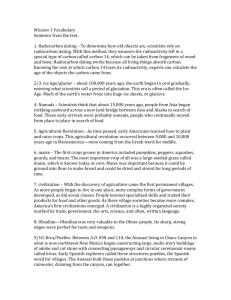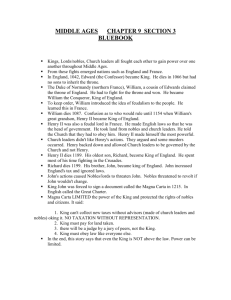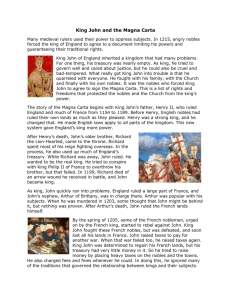WORLD NO # 4 Early Democratic Developments In England Mr. Lua
advertisement
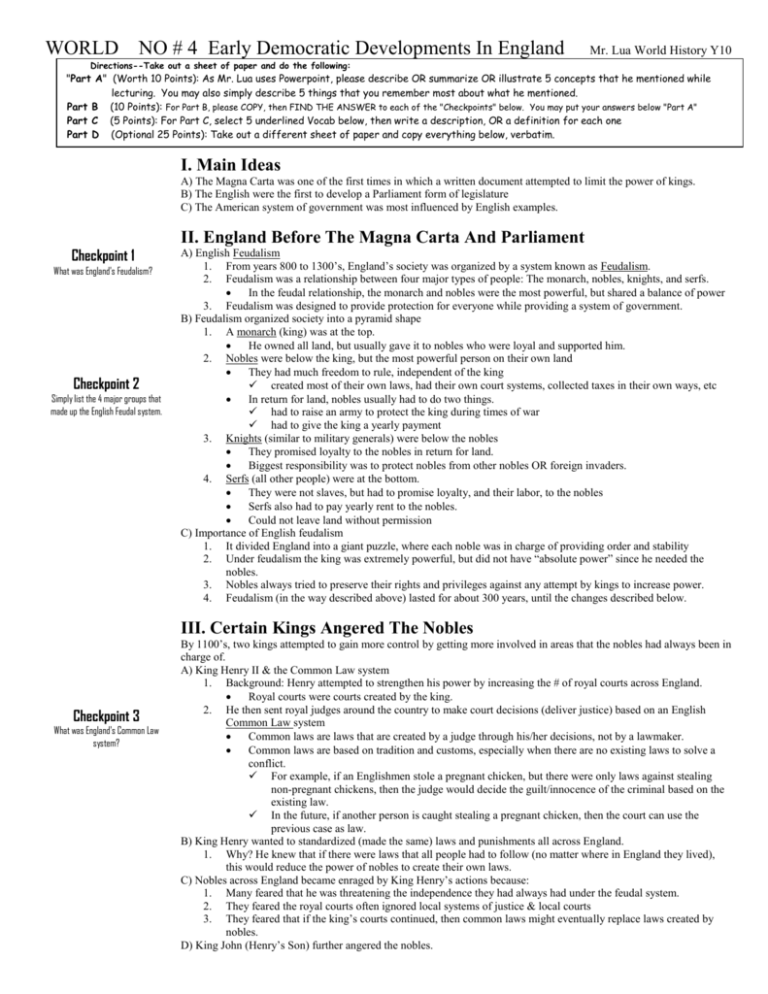
WORLD NO # 4 Early Democratic Developments In England Mr. Lua World History Y10 Directions--Take out a sheet of paper and do the following: "Part A" (Worth 10 Points): As Mr. Lua uses Powerpoint, please describe OR summarize OR illustrate 5 concepts that he mentioned while lecturing. You may also simply describe 5 things that you remember most about what he mentioned. Part B (10 Points): For Part B, please COPY, then FIND THE ANSWER to each of the "Checkpoints" below. You may put your answers below "Part A" Part C (5 Points): For Part C, select 5 underlined Vocab below, then write a description, OR a definition for each one Part D (Optional 25 Points): Take out a different sheet of paper and copy everything below, verbatim. I. Main Ideas A) The Magna Carta was one of the first times in which a written document attempted to limit the power of kings. B) The English were the first to develop a Parliament form of legislature C) The American system of government was most influenced by English examples. Checkpoint 1 What was England's Feudalism? Checkpoint 2 Simply list the 4 major groups that made up the English Feudal system. II. England Before The Magna Carta And Parliament A) English Feudalism 1. From years 800 to 1300’s, England’s society was organized by a system known as Feudalism. 2. Feudalism was a relationship between four major types of people: The monarch, nobles, knights, and serfs. In the feudal relationship, the monarch and nobles were the most powerful, but shared a balance of power 3. Feudalism was designed to provide protection for everyone while providing a system of government. B) Feudalism organized society into a pyramid shape 1. A monarch (king) was at the top. He owned all land, but usually gave it to nobles who were loyal and supported him. 2. Nobles were below the king, but the most powerful person on their own land They had much freedom to rule, independent of the king created most of their own laws, had their own court systems, collected taxes in their own ways, etc In return for land, nobles usually had to do two things. had to raise an army to protect the king during times of war had to give the king a yearly payment 3. Knights (similar to military generals) were below the nobles They promised loyalty to the nobles in return for land. Biggest responsibility was to protect nobles from other nobles OR foreign invaders. 4. Serfs (all other people) were at the bottom. They were not slaves, but had to promise loyalty, and their labor, to the nobles Serfs also had to pay yearly rent to the nobles. Could not leave land without permission C) Importance of English feudalism 1. It divided England into a giant puzzle, where each noble was in charge of providing order and stability 2. Under feudalism the king was extremely powerful, but did not have “absolute power” since he needed the nobles. 3. Nobles always tried to preserve their rights and privileges against any attempt by kings to increase power. 4. Feudalism (in the way described above) lasted for about 300 years, until the changes described below. III. Certain Kings Angered The Nobles Checkpoint 3 What was England's Common Law system? By 1100’s, two kings attempted to gain more control by getting more involved in areas that the nobles had always been in charge of. A) King Henry II & the Common Law system 1. Background: Henry attempted to strengthen his power by increasing the # of royal courts across England. Royal courts were courts created by the king. 2. He then sent royal judges around the country to make court decisions (deliver justice) based on an English Common Law system Common laws are laws that are created by a judge through his/her decisions, not by a lawmaker. Common laws are based on tradition and customs, especially when there are no existing laws to solve a conflict. For example, if an Englishmen stole a pregnant chicken, but there were only laws against stealing non-pregnant chickens, then the judge would decide the guilt/innocence of the criminal based on the existing law. In the future, if another person is caught stealing a pregnant chicken, then the court can use the previous case as law. B) King Henry wanted to standardized (made the same) laws and punishments all across England. 1. Why? He knew that if there were laws that all people had to follow (no matter where in England they lived), this would reduce the power of nobles to create their own laws. C) Nobles across England became enraged by King Henry’s actions because: 1. Many feared that he was threatening the independence they had always had under the feudal system. 2. They feared the royal courts often ignored local systems of justice & local courts 3. They feared that if the king’s courts continued, then common laws might eventually replace laws created by nobles. D) King John (Henry’s Son) further angered the nobles. Checkpoint 4 Why did King John anger the Nobles? 1. 2. 3. 4. 5. Background: King John launched a costly and unsuccessful war against France. The war became unpopular as England began to loose some of its land territories. King John then demanded that all nobles pay more taxes (in order to continue paying for the war) Nobles became extremely upset that he failed to consult them before making the demand This had been the procedure under the feudal system. This event led to the creation of the Magna Carta, discussed below IV. The Magna Carta Checkpoint 5 What was the Magna Carta? Checkpoint 6 How did the Magna Carta place limits on the King's powers? A) Magna Carta was a document that the nobles of England forced their king to sign in 1215. The document is to English history what the "Bill of Rights" is to United States history. B) Importance of the Magna Carta 1. It strengthened the idea that a king’s powers were limited, not absolute (never-ending) 2. In other words, it made it clear that even kings must obey laws and follow the concept of “rule of law” (which the Greek philosopher Aristotle had mentioned) 3. At first, it was ONLY designed to help out the nobles, but in later years it was extended to all Englishmen. C) The Magna Carta forced the king to recognize certain legal rights 1. Kings may not raise new taxes without first consulting Parliament (discussed below) 2. People should not be arbitrarily arrested (arrested by the king without good reason) 3. People should only be arrested if they are found guilty through existing laws, or by the decision of a jury. Jury = 12 people (from the same area) that decide the guilt or innocence of the person on trial. 4. Keep in mind that these ideas would heavily influence the American government of the future. V. Parliament Is Born Checkpoint 7 What is the English Parliament? Checkpoint 8 How is Parliament organized? Checkpoint 9 List to historically important things about the English Parliament A) Background: 1295—England got involved in another costly war with France 1. King Edward wanted to avoid the mistake of King John and voluntarily called for a meeting of England’s most important leaders. 2. Why? He wanted to ask for more $$$ through taxes but realized it would be wise to hear the concerns of others first. He also wanted to increase support for a war. 3. Edward’s actions worked as the above leaders gave their approval for higher taxes. 4. This meeting eventually led to the creation of the English Parliament B) What is the English Parliament 1. Parliament is a certain type of legislature, similar to the Ancient Greek Assembly or Ancient Roman Senate 2. It consists of a two-house body (has two parts) House of Lords (only nobles and religious leaders can be members) House of Commons (only knights & semi-wealthy people can be memers) 3. Parliament’s major responsibilities were: It had the “Power of the Purse” (power to approve any new taxes and decide how $$$ is spent) It created and passed laws Its members discussed politics and issues that faced England C) Importance of the English Parliament 1. It became a major method of checking (limiting) the power of the king. 2. In other words, it established Parliament would be a partner with the king when deciding the future of England. 3. Future governments (American, French, etc) would use it as an example English Parliament House Of House Of Members were: Members were: What powers did England’s Parliament have? :
